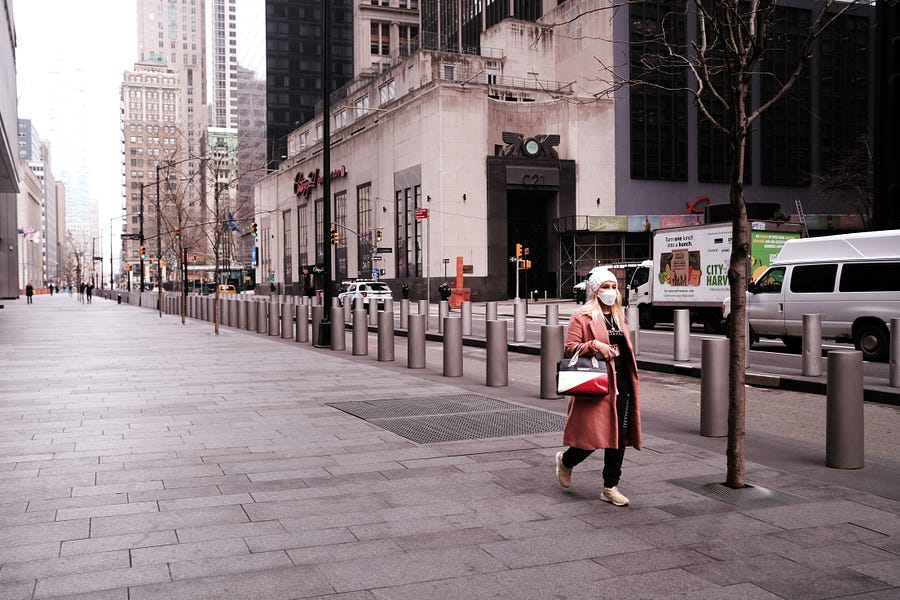With just over a week of serious national social distancing under our collective belts, it’s safe to say that most Americans have taken to our new anti-coronavirus regime with admirable quickness and good cheer. But the mass pause of the economy has led to worries about a new problem: Are we prepared to weather the economic damage that months of shutdown are likely to bring?
For President Trump and a growing number of congressional Republicans, the answer may be “no.” Trump has begun to remark upon the dangers of allowing “the cure to be worse than the problem,” and to promise that current shutdown measures are likely to continue for a period of weeks, not the months that many epidemiologists project may be necessary to avert national viral disaster.
“At a certain point, we have to get open and get moving,” Trump said at a White House press conference Monday afternoon. “We don’t want to lose these companies and we don’t want to lose these workers.”
Asked whether his top medical experts were on board with his swerve, Trump waved the question aside: “If it were up to the doctors, they may say let’s keep it shut down, let’s shut down the entire world, and let’s keep it shut for a couple years. You know, can’t do that, can’t do that with a country, especially the No. 1 economy in the world.”
The idea that Trump might have tired of listening to his medical advisers is deeply disconcerting. After all, it’s been only about a week since he finally got serious about taking steps to mitigate the disease’s spread beyond a travel ban in the first place. The nation’s top authorities on infectious diseases insist that the outbreak will get much worse before it gets better, and that our best hope of getting through it relatively safely is to lock down hard for as long as we can afford. “Social distancing only works if it is implemented widely and universally,” Yale immunologist Akiko Iwasaki told The Dispatch last week. “If a significant portion ignores these measures, there will be more pockets of outbreaks everywhere.”
But it’s impossible to deny that Trump’s comments tapped into a frustration many economically vulnerable Americans are currently feeling—a frustration that is only likely to grow stronger in the days ahead, and which policymakers ignore at their peril.
Medical and economic experts agree that concerns about byproducts of the freeze, including dramatic damage to the U.S. economy, must soon begin to factor into our coronavirus response at some level. On Monday, Dr. Amesh Adalja, a scholar at the Johns Hopkins University Center for Health Security, wrote an article arguing that we must consider the ways in which the freeze’s “cascading effects … may be worse than those of the virus itself.”
“Quality of life consists largely in the ability to engage in the activities that make up our lives, and central to those activities is work,” Dr. Adalja wrote. “Jobs cannot be easily parsed into ‘life-sustaining’ and ‘non-life-sustaining’ enterprises. … Stopping people from working is like depriving a limb of blood flow. Though action is sometimes necessary in an emergency, irreparable and irreversible harm will occur if it is prolonged.”
Dr. Paul Offit, a pediatrician and virologist at the Children’s Hospital of Philadelphia, tells The Dispatch that much of that harm is likely to express itself as a second health crisis.
“I think we are in the process of facing two public health emergencies,” he said. “The first is that caused by the suffering, hospitalization, and death caused by this virus. The second is the public health emergency that’s going to come when we have a major financial downturn. … You have joblessness, which leads to homelessness, which leads to despair, which leads to mental health-associated physical problems, which leads to depression, which leads to child abuse, which leads to domestic abuse, which leads to violence and crime.
“So it’s all a public health issue. It’s sort of pay me now, pay me later. There is no perfect answer to all this.”
Two facts grow clearer by the day. The first is that, at this stage in the pandemic, the U.S. lacks any truly good options. The second is that treating our public health and our economy as competing ends our society must choose between is unfeasible. To attempt to choose a path designed solely to protect either, in fact, seems a sure bet to meet both ends we wish to avoid at once.
Simply allowing the economy to stall out for months is likely to vaporize millions of jobs, forcing innumerable Americans out of their livelihoods, off their health insurance, even out of their homes. To stand by and allow such a collapse risks not only economic ruin, but a nearly guaranteed second public health crisis—exactly the thing we’d be supposedly tanking the economy to prevent.
Yet the opposite case promises no better. Epidemiologists speak with one voice on this: If distancing efforts are abandoned too early, the coronavirus will simply resume its brisk and vicious colonization of the entire United States. Hospitals will totter under the impossible strain of trying to treat critically ill patients by the dozens, hundreds, thousands. Millions may die, both from the virus and from the simple lack of the medical resources and attention that is ordinarily abundant. And after all this—because of all this—the economy would tank again anyway.
If neither extreme is acceptable, then the nation’s task becomes working out what the proper balance, that brings the least harm to the most people, is likely to be. But this task too is incredibly difficult. It’s not a simple question of how many businesses we can ask to remain closed. Stabilizing the economy requires providing clarity to business owners about exactly how long they can expect the shutdown to last, so they can plan around the financial hit best they can in the meantime. But fighting the epidemic effectively requires exactly the opposite approach: Waiting for the data to come in on how effective containment has been before making any decisions about whether and where to relax active measures.
Part of the problem is the lack of established goals for social distancing beyond the abstract ones of keeping cases as low as possible and flattening the infection curve. “We don’t really have a good federal policy in place to sort of let us know what we’re looking for, to determine whether or not people go back to school, people go back to work,” Dr. Offit said. “We lack a federal policy.”
Some experts remain hopeful the Trump administration will find a way to untangle this Gordian knot. After all, if anyone has the resources to bring together the world’s leading economists and medical experts to hash out an ideal compromise path forward, it’s the federal government of the United States.
“This is why the White House is the quarterback,” the Heritage Foundation’s Paul Winfree, who formerly served as deputy director of Trump’s Domestic Policy Council, tells The Dispatch. “What the White House ultimately should do—and if not the White House, somebody should do—is they should put together a blue ribbon panel of different experts who are thinking about the same problem from different perspectives, and they should come up with a bunch of different scenarios and present those scenarios to the American public so the American public can ultimately decide what we want to do.”
That’s one possibility. But it’s hard not to feel like there’s a likelier scenario developing, one in which competing factions lobby the president privately over the coming days to sway him to their way of thinking, followed by him going with his gut.
“We’ve learned a lot during this period. This was a very necessary period. Tremendous information was gained. But we can do two things at one time,” Trump said Monday. “And again, I say we have a very active flu season. More active than most. It looks like it’s heading to 50,000 or more deaths, which, that’s a lot. And you look at automobile accidents, which are far greater than any numbers we’re talking about. That doesn’t mean we’re going to tell everybody no more driving of cars.”
Photograph by Spencer Platt/Getty Images.






Please note that we at The Dispatch hold ourselves, our work, and our commenters to a higher standard than other places on the internet. We welcome comments that foster genuine debate or discussion—including comments critical of us or our work—but responses that include ad hominem attacks on fellow Dispatch members or are intended to stoke fear and anger may be moderated.
With your membership, you only have the ability to comment on The Morning Dispatch articles. Consider upgrading to join the conversation everywhere.